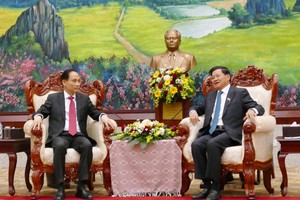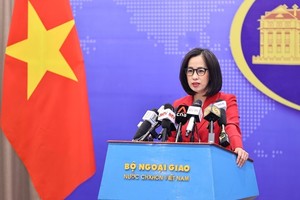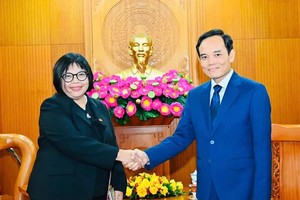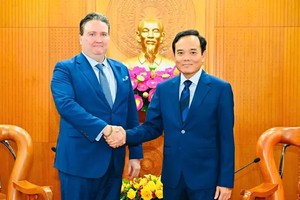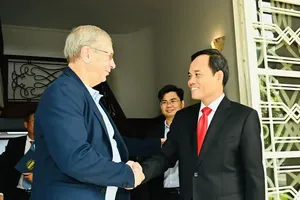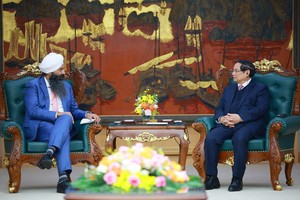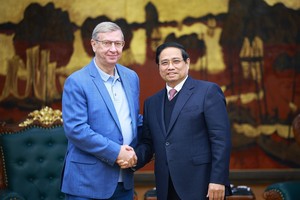Rebels Tuesday had the key city of Sirte in their sights as world powers mapped out a post-Kadhafi future for Libya and President Barack Obama warned against ousting the strongman by force.
The rebels, who launched their uprising against Kadhafi's four-decade rule in mid-February, were regrouping after being pummeled by loyalist forces at the village of Harawa, 60 kilometres (35 miles) from Sirte, Moamer Kadhafi's birthplace.
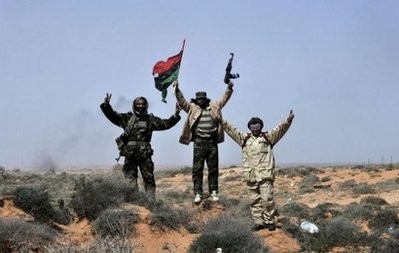
Emboldened by Western air strikes that allowed them to overrun the strategic town of Ajdabiya on Saturday, the rebels raced westwards towards Sirte before on Monday coming heavy artillery attack first at Bin Jawad, 140 kilometres from Sirte, and then, at nightfall, at Harawa.
Coalition warplanes were again in action late Monday after darkness fell, bombing regime targets on the central coast and in the west, but US officials denied the military action was intended directly to help the rebels.
Obama argued Libya would be better off without Kadhafi and staunchly defended his decision to rain air strikes on the Libyan leader's troops in a UN-mandated bid to protect civilians.
"As president, I refused to wait for the images of slaughter and mass graves before taking action," Obama said, arguing that America had a "responsibility" to intervene to prevent civilian massacres.
But the US president cautioned the military campaign was not aimed at ousting the veteran Libyan leader by force and introducing regime change.
"To be blunt, we went down that road in Iraq," Obama said. "If we tried to overthrow Kadhafi by force, our coalition would splinter. We would likely have to put US troops on the ground, or risk killing many civilians from the air.
On the eve of an international conference in London on Tuesday to map out a post-Kadhafi landscape for Libya, Obama urged the international community to support "a transition to the future that the Libyan people deserve."
"Even after Kadhafi does leave power, 40 years of tyranny has left Libya fractured and without strong civil institutions," Obama warned.
"The transition to a legitimate government that is responsive to the Libyan people will be a difficult task," he added, saying it was a challenge for both the international community and the Libyan people.
Britain, France, Germany and the United States have agreed that the London talks should aid "the political transition in Libya," said a French presidency statement.
British Prime Minister David Cameron and French President Nicolas Sarkozy said ahead of the London talks that the current regime had lost all legitimacy.
"Kadhafi must therefore go immediately. We call on all his followers to leave him before it is too late," they said in joint statement.
In a pre-meeting video conference with his fellow leaders Monday, Cameron said he hoped the summit would "strengthen and broaden the coalition of countries committed to implementing the UN resolutions".
Forces loyal to Kadhafi have ended their onslaught on rebel-held Misrata and "calm" had been restored, the Libyan foreign ministry also announced, without clearly indicating whether the town was back under loyalist control.
Libya's deputy foreign minister Khaled Kaim accused the coalition forces of wanting to cut the country in two, in comments broadcast on Italian television late Monday.
"The tactic of the coalition is to lead to a stalemate to cut the country in two, which means that the civil war is a continuous war, the start of a new Somalia, a very dangerous situation," he told the Rai Uno channel.
The Pentagon said Monday that the United States used low-flying A-10s and AC-130s combat aircraft against Kadhafi's ground troops over the weekend.
But US Vice Admiral Bill Gortney, director of the US military's Joint Staff, said the US actions were only in support of the UN-backed resolutions to protect Libyan civilians.
"We're not in direct support of the opposition, that's not part of our mandate and we're not coordinating with the opposition," he said.
NATO has finally taken over enforcing a no-fly zone and flew its first enforcement mission over Libya on Sunday in the operation codenamed "Unified Protector".
"Our goal is to protect civilians and civilian-populated areas under threat of attack from the Kadhafi regime," said NATO Secretary General Anders Fogh Rasmussen. "NATO will implement all aspects of the UN resolution. Nothing more, nothing less."
Officials said the transfer of full military command would take 48 to 72 hours, but Obama said it would be completed on Wednesday.
Attempting to convince a war-weary public about his decision to intervene in Libya, Obama also vowed that the US military would reduce its involvement as allies step up to bear the brunt of the operations.
"In that effort, the United States will play a supporting role -- including intelligence, logistical support, search and rescue assistance, and capabilities to jam regime communications," he said.
Life, meanwhile, returned to something like normal in the rebel's eastern stronghold of Benghazi after a fierce onslaught last week, but the insurgents say it will not become the capital of a rebel state -- their aim is to take Tripoli and rule over a unified, post-Kadhafi Libya.
Qatar became the second nation, after France, to recognise the rebels' Provisional Transitional National Council as the "sole legitimate representative" of the Libyan people.
